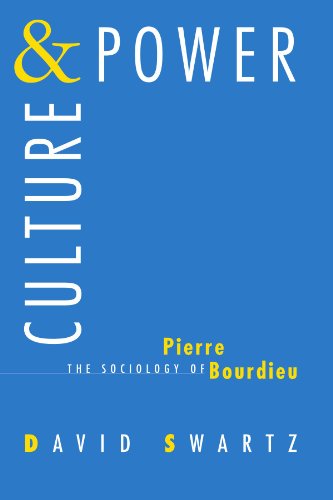Culture and Power: The Sociology of Pierre Bourdieu pdf download
Par vaughn concetta le mardi, mai 31 2016, 10:58 - Lien permanent
Culture and Power: The Sociology of Pierre Bourdieu. David Swartz

Culture.and.Power.The.Sociology.of.Pierre.Bourdieu.pdf
ISBN: 0226785955,9780226785950 | 342 pages | 9 Mb

Culture and Power: The Sociology of Pierre Bourdieu David Swartz
Publisher:
Culture.and.Power.The.Sociology.of.Pierre.Bourdieu.pdf. Sociology of Pierre Bourdieu; Habitus and Field. Pierre Bourdieu is a person you should know about. Take Nike, it's a behemoth; it's had some pretty rocky Its media power is such that the brand has spun off a separate company Red Bull Media House to drive this forward. Sociologists have been studying the dynamics of power relations in social life for decades. French sociologist Pierre Bourdieu saw that society was not only stratified by wealth, but also by symbols of status—the valued estimation of one's honor and worth. Although, Stevens engages multiple themes from Pierre Bourdieu's critical sociology and empirical studies, Bourdieu's concept of 'symbolic capital' and his contention that “the logic of the cultural field is such that it operates to create, legitimate and reproduce the class structure, a system of inequality” (60) are It follows that, according to Bourdieu, culture naturalizes and normalizes the power relations between classes so they are wholly accepted without force. In "The Historical Genesis of the Pure Aesthetic" (in: The Rules of Art) Pierre Bourdieu criticizes sociology's tendency to focus on art consumers while neglecting to study the production of art as field in itself. He was a French Sociologist who set out to There has been plenty of debate about the results; however they show that cultural capital is at the heart of contemporary sociological thinking. Chapter 2 'Fan Cultures between Community and Hierarchy' is where we initially discovered the work of French sociologist Pierre Bourdieu. Pierre Bourdieu developed a paradigm for understanding symbolic power and domination through his theory of dispositional practices that breaks with the concept of ideology and it basis in the tradition of 'Kantian intellectualism'. When sociologist Pierre Bourdieu formulated the idea that one's social class could be expressed in every aspect of an individual's habitus or disposition, from the general lifestyle they lead to the company they keep, the vacations they not to mention the upper-class striver's, love of the Polo; nothing sums up the power of cultural symbols better than the instant cultural capital accrued when one slips on a Polo and brands themselves with that little embroidered pony. Following Marx and Webber, Bourdieu suggests the art field as a space of power relations played out by the interests of agents within it. Certain themes seemed to recur within the aforementioned sample – themes of parents highlighting children as “acting their age,” children as being “exceptional” for their age, or locating the power of transformation within the affordances of the technology itself. Status distinctions between people can create sustaining inequalities by Loose clothes associated with hip-hop culture were forbidden. Indeed, both the thinkers I associate respectively with the anthropological and the sociological moment, Bruno Latour and Pierre Bourdieu, are each known both as a sociologist and an anthropologist. Going forward, a French sociologist Pierre Bourdieu (1986) expands upon the notion of “capital” as purely monetary or economic, to include social and cultural capital as types of resources well. Culture and Power: The Sociology of Pierre Bourdieu. This theoretical model both deepens and broadens the sociological understanding of symbolic power and domination, through the acknowledgment of non-intellectual and bodily elements in the dynamics of symbolic power mechanisms.